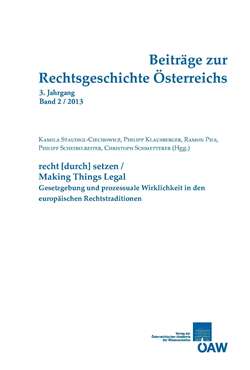
Beiträge zur Rechtsgeschichte Österreichs 2 / 2013, pp. 349-354, 2014/01/30
recht [durch] setzen - Making Things Legal.
Gesetzgebung und prozessuale Wirklichkeit in den europäischen Rechtstraditionen

Justice was administered in the name of the king by his judges before the French revolution. Criminal decisions were not founded on the judges’ own findings. They were theoretically based on a tripartite classification of proofs according to their probative value: the statutory proofs theory. Is the use of the term "statutory" legitimate to describe such an organization? According to the litteral meaning of the word it originates from the medieval civil and canon law. In Modern Times texts such as the Constitutio Criminalis Carolina expressly referred to it whereas French legislation was much more sparse. We should examinate other sources of law, doctrine and case law to understand the history of this theory. In 1668 Louis XIV. created the parliament of Flanders, a royal court of justice. A study of its criminal sentences will highlight the judges' attitude in front of this classification of proofs.